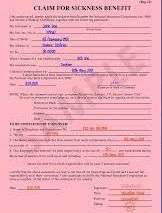
Medical Certificates and Sick Leave St Lucia: What’s Required?
Sick leave in St. Lucia stands as a pivotal aspect of workplace rights and regulations. For both employers and employees, understanding the intricacies of sick leave entitlements and procedures is essential. This guide delves into the legal framework, entitlements, and key procedures related to sick leave in St. Lucia, ensuring clarity for all stakeholders involved.

Sick leave is an essential aspect of employment that ensures employees have the necessary time off to recover from illness or injury without facing financial hardship. In St. Lucia, sick leave is governed by specific laws and regulations that protect the rights of both employers and employees. Understanding the intricacies of sick leave entitlements, procedures, and benefits is crucial for both employers and employees to ensure a fair and harmonious working environment.
Legal Framework for Sick Leave
In St. Lucia, the legal framework for sick leave is primarily governed by the Labour Act. According to this legislation, employees are entitled to sick leave benefits after completing a probationary period of three months with their employer. The Act ensures that employees are protected from unfair treatment or dismissal due to illness or injury.
Under the Labour Act, an employee is entitled to a maximum of 14 paid sick days per year. However, this entitlement may vary depending on the length of service and the terms of the employment contract. Employers may also provide additional benefits beyond the statutory requirements as part of their company policies.
In St. Lucia, there is a distinction between sick days and sick leave, which relate to different aspects of an employee’s time off due to illness or injury. Here’s an explanation of the difference between these two terms:
1. Sick Days refer to the specific number of days that an employee is allowed to be absent from work due to illness or injury, as outlined by the employer’s policies or employment contract. Sick days are typically a set number of days provided by the employer as part of their leave policy. These days may be fully paid, partially paid, or unpaid, depending on the employer’s policy.
2. Sick Leave, on the other hand, refers to the broader concept of time off granted to an employee for medical reasons. It encompasses the duration of absence beyond the allocated sick days. It may include both the sick days provided by the employer and any additional time off needed beyond those days.
During sick leave, employees may be entitled to various benefits, such as sick pay or statutory sick pay, depending on the employer’s policies and compliance with labor laws; typically governed by the employment contract, labor laws, or collective agreements.
Sick Days Entitlements
Employees in St. Lucia are entitled to paid sick days based on their length of service with an employer. During the first year of employment, an employee is entitled to one day of paid sick day for every two months worked. After completing one year of service, the entitlement increases to one day per month.
It is important to note that unused sick days does not carry over to the following year, and employees cannot accumulate sick days beyond their annual entitlement. However, if an employee exhausts their sick days entitlement, they may be eligible for unpaid sick leave or other forms of leave, such as vacation leave or compassionate leave, depending on the circumstances.

Sick Leave Procedures
To avail sick leave benefits, employees are generally required to notify their employer as soon as possible. The notification should include the reason for the absence and an estimated duration of the leave. Some employers may also require employees to provide medical certificates or other supporting documentation to substantiate their illness or injury.
It is essential for employees to adhere to their employer’s sick leave policies and procedures to avoid any potential disciplinary actions or disputes. Employers, on the other hand, should ensure that their policies are clear, accessible, and in compliance with the legal requirements.
Employer Responsibilities and Employee Rights
Employers have a responsibility to provide a safe and healthy working environment for their employees. This includes implementing measures to prevent illness or injury and promoting employee well-being. Employers should also respect and uphold the rights of employees to take sick leave when necessary without fear of discrimination or retaliation.
Employees, on the other hand, have the right to privacy regarding their medical conditions and should not be subjected to unnecessary inquiries or intrusive questioning by their employers. It is important for both parties to maintain open lines of communication and mutual respect when it comes to sick leave matters.
In St. Lucia, NIC (National Insurance Corporation) provides social security coverage to employees, including benefits related to sickness and maternity. While sick leave is a separate entitlement provided by employers, NIC benefits can supplement an employee’s income during a period of sickness or injury.
Here’s how NIC and sick leave work in St. Lucia:
1. National Insurance Corporation (NIC): NIC is a government-operated organization in St. Lucia that administers social security programs. It provides coverage for various benefits, including sickness, maternity, retirement, and more.
2. Sickness Benefit: Employees who are registered with NIC may be eligible for the Sickness Benefit. This benefit provides income replacement during a period of illness or injury when an employee is unable to work. The amount of the benefit is based on the employee’s contributions and qualifying criteria set by NIC.
3. Sick Leave from Employer: Sick leave refers to the time off an employee takes from work due to illness or injury. The specific leave entitlement, duration, and pay are determined by the employer’s policies, employment contracts, or collective agreements. The leave provided by employers is separate from the NIC’s Sickness Benefit.
4. Interaction between Sick Leave and Sickness Benefit: Employees can utilize sick leave provided by their employer and also apply for the Sickness Benefit from NIC simultaneously, subject to meeting the eligibility criteria for both. The leave provided by the employer may be paid leave, while the Sickness Benefit from NIC offers additional financial support during the period of illness.
5. Application Process: To apply for the Sickness Benefit from NIC, the employee needs to submit a claim to NIC along with the necessary documentation, including medical certificates or doctor’s notes confirming the illness or injury. The specific application process and required documents can be obtained from NIC directly.
It’s important to note that the exact details of leave entitlements and NIC benefits can vary depending on the specific employer’s policies and the individual’s contribution history with NIC. To obtain further information regarding these benefits, it is advisable to consult the employment contract, company policies, and directly contact the National Insurance Corporation in St. Lucia.
The application process and procedures for sick leave in St. Lucia may vary depending on the specific employer and their policies. However, here are some general guidelines and dos and don’ts to keep in mind:
Dos:
1. Notify your employer: As soon as you realize you are unable to attend work due to illness or injury, inform your employer or the designated point of contact according to your company’s policies. It is essential to provide prompt notification to allow your employer to make necessary arrangements.
2. Follow the company’s procedure: Familiarize yourself with your employer’s leave policy and adhere to the specified procedures. This may include providing a medical certificate or doctor’s note within a specific timeframe.
3. Obtain a medical certificate: Visit a qualified medical professional to obtain a medical certificate or doctor’s note detailing the nature of your illness or injury. Ensure that the medical certificate includes the dates for which you are recommended to take sick leave.
4. Keep your employer updated: If your illness or recovery extends beyond the initial period mentioned in the medical certificate, communicate with your employer and provide updated information regarding your condition and expected return to work date.
5. Maintain confidentiality: While it is important to inform your employer about your illness, it is equally important to respect the privacy of your medical information. Share only necessary details with the appropriate personnel within the organization.
Don’ts:
1. Don’t delay notification: Avoid delaying or neglecting to inform your employer about your illness. Promptly communicating your absence due to illness helps your employer plan and manage workload and resources effectively.
2. Don’t abuse sick days/leave privileges: Sick days/leave is intended for genuine illness or injury. Avoid using sick leave for personal reasons or taking advantage of the system. Misuse of these can negatively impact your professional reputation and may have consequences as per your employer’s policies.
3. Don’t ignore company policies: Familiarize yourself with your employer’s sick leave policies and follow the established procedures. Failure to comply with the company’s guidelines may result in disciplinary action or loss of benefits.
4. Don’t provide false information: When obtaining a medical certificate, ensure that the information provided by the medical professional is accurate and truthful. Providing false information can lead to serious consequences, including termination of employment.
5. Don’t exceed your entitlement: Be aware of your leave entitlement as per your employment contract or company policies. Exceeding your entitled sick leave without proper justification may have consequences, including loss of pay or disciplinary action.
It’s important to note that these dos and don’ts provide general guidance. For specific information and guidance related to sick leave, it is advisable to refer to your employment contract, company policies, or consult with your employer’s human resources department for precise instructions and procedures.

When filling out a sick leave form, the exact format and requirements may vary depending on your employer’s policies. However, here are some common steps and information to include:
1. Personal Information: Provide your full name, employee identification number, department, position, and contact details.
2. Date(s) of Absence: Indicate the specific date(s) you were absent or will be absent due to illness or injury.
3. Reason for Absence: Clearly state the reason for your absence, such as illness or injury. Keep the explanation concise but provide enough detail to convey the nature of your condition.
4. Duration of Absence: Specify the number of days you expect to be absent or the duration of the sick leave you are requesting.
5. Medical Certification: Attach a medical certificate or doctor’s note as required by your employer. The medical certificate should include the name and contact information of the healthcare professional, the date of examination, the diagnosis or description of the illness or injury, and the recommended period of sick leave.
6. Additional Documentation: If your employer requires any additional documentation, such as a prescription or medical test results, make sure to include them with your form.
7. Signature and Date: Sign and date the form to certify that the information provided is accurate to the best of your knowledge.
8. Submission: Follow your employer’s instructions regarding the submission of the form. This may involve submitting the form to your immediate supervisor, the human resources department, or a designated contact person.
Remember to keep a copy of the completed form and any supporting documents for your records. If you have any questions or uncertainties about filling out the sick leave form, it is advisable to consult with your employer’s human resources department or supervisor for guidance.
Note: The above steps are a general guide, and the specific requirements for your employer’s sick leave form may differ. It is important to refer to your company’s policies and procedures or seek guidance from your employer to ensure that you provide all the necessary information and follow the correct process when filling out a sick leave form. By adhering to these guidelines, employers can create a supportive workplace culture, while employees can confidently take the necessary time off to recover from illness or injury without facing financial hardship.
Disclaimer: The information provided in this content is for general informational purposes only. It is not intended as medical or healthcare advice, diagnosis, or treatment. Always seek the advice of a qualified healthcare professional with any questions you may have regarding a medical condition or healthcare decisions.
















